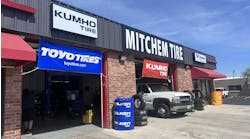When asked what artificial intelligence (AI) is, ChatGPT — an artificial intelligence chatbot — said this:
“Artificial Intelligence refers to the development of computer systems and machines that can perform tasks that typically require human intelligence. By simulating human intelligence, AI technology aims to automate and enhance various processes, solve complex problems and improve efficiency in a wide range of fields such as healthcare, finance, transportation and more.”
AI seems to be at the forefront of every tire dealer's mind — no matter the size of the tire dealership.
From RNR Tire Express, which has over 180 locations, to Kilgore Tire Services, which has two locations, and Ghanim Group dba Tire Store Service Center with nine locations, dealers are dipping their toes in the AI world.
AI utilization can vary
Darrin Mallett, president at the Kilgore, Texas-headquartered dealership, says that his first interaction with AI was through ChatGPT.
“I saw an advertisement and downloaded the app and started using it within my businesses by having it help me reply to customer Google reviews or create some emails,” says Mallett.
As of now, Mallett is the only employee at Kilgore utilizing AI.
“I use it for writing, answering questions, updating policy, creating a mission statement and things along those lines,” he says.
Mallett says he wants to get comfortable with the new software before introducing it to the rest of his team.
However, RNR Tire Express is doing the opposite.
“RNR Tire Express is using AI as much as we can right now and are utilizing it in stores, but we are mainly focusing on the corporate side of it right now,” says Adam Sutton, president, RNR Tire Express.
“We are actually building a new point-of-sales (POS) system that our entire operating system will switch over to and we are releasing that in modules.”
RNR started rolling out its POS system in January of last year. The company rolled out price quoting first and then AI analytics of predictive pricing and inventory management came next, according to Sutton.
Although Mallett and Sutton operate different sized dealerships, both believe that product and demand forecasting will be the biggest asset that AI can help tire dealers with.
Baker Ghanim, president of Tire Store Service Center, a Bedford, Texas-based dealership, says he wants to break the utilization of AI in dealerships in two categories — near term changes and future changes.
“For the near term, with more tire sizes and patterns in the market than ever, and our business model of stocking over 2,500 tires per location, we are trying to use AI to help us manage our inventory across our nine locations,” says Ghanim.
“We believe that an AI tool can manage orders from suppliers and in-company transfers.”
However, the AI tool must take into account the location's sales trends, tire tiers, dealer and consumer rebate programs, seasonal trends and more, according to Ghanim.
His goal is to have “software that will look to see if there is an alternative option in stock or overstock at a different location before ordering a specific tire size and tier.”
In the future, maybe 10 years from now, he believes AI will become more integrated into the day-to-day operations. Such as, putting a car in a bay with a technician at the right time, predicting the expected time required for repair, the current tire condition and more.
“These factors will determine the work needed and the arrival time to service the customer.”
AI in POS systems
The new POS system that RNR is releasing in modules will have demand forecasting and product inventory bult into it. It will also give more data analytics.
“The system will give us cleaner data than we’ve ever had before to make data-driven decisions, and then we are going to be utilizing AI to help make those decisions and predict and forecast the things we should be doing,” says Sutton.
Mallett agrees that AI can work “faster than our brains” when it comes to inventory.
“It could really help if I can come in Monday morning and say, ‘I need 2,000 pounds from Goodyear,” and put the parameters in the system and have it spit out a suggested order,” explains Mallett.
Another task that AI is helping with is marketing.
Similar to Mallett, RNR says it uses ChatGPT to create scripts for training videos or scripts for salespeople.
RNR’s learning monitoring system (LMS) can also create a digital character through AI and have it follow prompts.
“Historically, we’ve had to film videos and get an actor or a trainer and carve out studio time and write a script and then pay everyone,” says Sutton.
“Now, we can go to ChatGPT and say, ‘Write me a script about tire safety with topics x, y and z.’ And that won’t give you the final output but it's going to get you 60 to 80% of the way there. Once the script is done, we can put that into the AI technology that will generate a person following the script.”
Imagery is another way AI can be utilized for marketing.
Jason Sexton, creative director for RNR Tire Express says the biggest challenge for marketing is always visuals.
“Midjourney is an AI text to image generator that we utilize,” says Sexton.
“I can type into the text to image ‘Jeep Wrangler climbing over rocks at sunset’ and in one minute it will generate a high-resolution image that looks real.”
“The other thing I think of immediately that AI could improve upon in our industry is the service writer position,” says Mallett.
“There is so much to keep up with in a given day that we can forget to do little things or drop the ball on them. Sometimes we drop the ball on calling people back or ordering something, so having a POS system that could remind the dealer, ‘Did you put the order in for those tires?’ or ‘Did you call that customer back?’ would be really helpful.”
Another thing AI could help service writers with is the communication between customers and technicians.
According to Mallett, if a service writer is inexperienced and a customer brings their vehicle in for inspection there may be some questions that the technician would want to know the answer to that the service writer just doesn’t think to ask.
“For example, if a car comes in and it’s overheating, mechanics will want to know if it overheats in the morning or afternoon or just when the customer starts it up,” says Mallett.
“These are the things mechanics will want to know when diagnosing the problem, so if an AI POS system that is intuitive and asks those questions would help not only mechanics but service writers too.”
Potential resistance
“One of the things I think is super important is change management and training,” says RNR's Sexton.
“Whenever you implement a new process — especially something to this level — it's important that you look at the changes it's going to have on workflow, processes and job roles within the organization.”
Sexton says dealers need to prepare for potential resistance to change and implement effective change management strategies like upskilling opportunities for employees to ensure they have the necessary skills to work with AI.
“In essence, it’s like when the first accountant was able to use a calculator at their desk instead of doing everything on a spreadsheet,” says Sexton.
“People shouldn’t be afraid of it. It’s a new tool to make you even stronger and better.”
Mallett agrees that AI is a tool for employees rather than a replacement for employees.
“I remember when people were nervous about robots coming over and taking jobs, but the thing is people don’t want to do manual labor as much,” says Mallett. “So, these machines took care of it. That is how I view AI.”
He continues by saying he doesn’t believe AI is a manual labor tool, but it can free people up from the stuff they really don’t want to do.
“Plus, AI creates more jobs because you’ll need people monitoring the software and implementing and teaching it,” he says.
Sexton draws similarities to the internet and AI when the internet was first released to the public.
“A lot of people viewed the internet as a fad — like it was only something geeky people use,” says Sexton.
“But it completely changed our way of life, like the introduction of the cellphone. I find AI equivalent to these in the way it will affect and influence consumers.”
Ghanim believes that AI will not become the new norm within the industry for another 10 years but believes the shift to AI will be “gradual and natural because the machine will be so good that it will be our preferred option because it never damages a tire or wheel.”
Where to start
“To start in AI, it is important to identify what your goal is,” says Sexton.
He says that goal could be enhancing customer experience, becoming more efficient or gaining a competitive edge over competitors.
“What are you trying to get from the system, and then make sure you evaluate different systems or different AI programs that will help you achieve your goals. Once that is in place you can move forward by bringing it into your company.”
A good way to pinpoint goals for your dealership is to look at repetitive actions happening in your dealership, according to Sexton.
“Take that repetitive, mundane task to AI and free up someone's time to be more powerful and save money,” he says.
Sutton reminds dealers that AI is only as good as the data it pulls information from, so it is important to effectively communicate with AI on what you need or want.
Sexton recommends adding an AI chief officer — a newly created role — to the team. Put that person in charge of AI and its tasks within the tire dealership.
“Part of the process is educating and training people so they understand we aren’t trying to replace anyone, but actually trying to expand and enhance their role” says Sexton about the apprehension around AI.
“AI isn’t coming,” says Sutton. “It’s here and if you can be an early adapter and put somebody on your team that knows how to do it, it can help and enhance, not hurt and hinder.”
Ghanim says he has a new shop in the works and is taking these industry changes into account.
“We are designing our shop in the shape of a circle with bays all around the shop, and technicians in the center of the shop,” says Ghanim.
“The setup facilitates smoother communication today and will set us up for a more efficient shop in the future.”
Mallett encourages tire dealers to educate themselves on AI and become comfortable with the upcoming changes it will bring to the tire industry.
“If you’re not changing, you’re not growing,” says Mallett.



